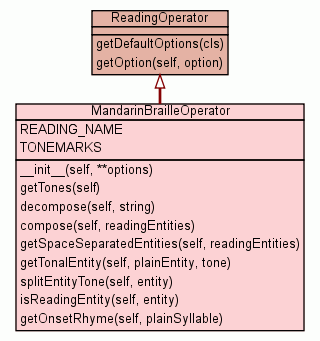
| Home | Trees | Indices | Help |
|
|---|
|
|

Provides an operator on strings written in the Braille system.
|
|||
|
|||
| set |
|
||
| list of str |
|
||
| str |
|
||
| list of str |
|
||
| str |
|
||
| tuple |
|
||
| bool |
|
||
| tuple of str |
|
||
|
Inherited from Inherited from |
|||
|
|||
|
Inherited from |
|||
|
|||
READING_NAME = Unique name of reading |
|||
TONEMARKS = |
|||
|
|||
|
Inherited from |
|||
|
|||
Creates an instance of the MandarinBrailleOperator.
|
Returns a set of tones supported by the reading.
|
Decomposes the given string into basic entities that can be mapped to one Chinese character each (exceptions possible). The given input string can contain other non reading characters, e.g. punctuation marks. The returned list contains a mix of basic reading entities and other characters e.g. spaces and punctuation marks.
|
Composes the given list of basic entities to a string. No special treatment is given for subsequent Braille entities. Use getSpaceSeparatedEntities() to insert spaces between two Braille syllables.
|
Inserts spaces between to Braille entities for a given list of reading entities. Spaces in the Braille system are applied between words. This is not reflected here and instead a space will be added between single syllables.
|
Gets the entity with tone mark for the given plain entity and tone.
|
Splits the entity into an entity without tone mark and the name of the entity's tone.
|
Returns true if the given entity is recognised by the reading operator, i.e. it is a valid entity of the reading returned by decompose(). The default implementation will raise a NotImplementedError.
|
Splits the given plain syllable into onset (initial) and rhyme (final).
|
| Home | Trees | Indices | Help |
|
|---|
| Generated by Epydoc 3.0.1 on Tue May 19 22:38:38 2009 | http://epydoc.sourceforge.net |